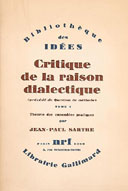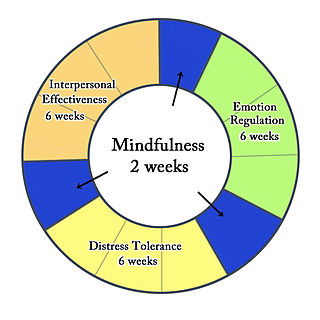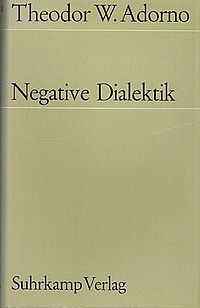Dialectic, also known as the dialectical method, is a discourse between two or more people holding different points of view about a subject but wishing to establish the truth through reasoned argumentation. Dialectic resembles debate, but the concept excludes subjective elements such as emotional appeal and rhetoric. Dialectic may thus be contrasted with both the eristic, which refers to argument that aims to successfully dispute another's argument, and the didactic method, wherein one side of the conversation teaches the other. Dialectic is alternatively known as minor logic, as opposed to major logic or critique.

Atropos or Aisa, in Greek mythology, was one of the three Moirai, goddesses of fate and destiny. Her Roman equivalent was Morta.

Critique of Dialectical Reason is a 1960 book by the philosopher Jean-Paul Sartre, in which the author further develops the existentialist Marxism he first expounded in his essay Search for a Method (1957). Critique of Dialectical Reason and Search for a Method were written as a common manuscript, with Sartre intending the former to logically precede the latter. Critique of Dialectical Reason was Sartre's second large-scale philosophical treatise, Being and Nothingness (1943) having been the first. The book has been seen by some as an abandonment of Sartre's original existentialism, while others have seen it as a continuation and elaboration of his earlier work. It was translated into English by Alan Sheridan-Smith.

Dialectical behavior therapy (DBT) is an evidence-based psychotherapy that began with efforts to treat personality disorders and interpersonal conflicts. Evidence suggests that DBT can be useful in treating mood disorders and suicidal ideation, as well as for changing behavioral patterns such as self-harm and substance use. DBT evolved into a process in which the therapist and client work with acceptance and change-oriented strategies, and ultimately balance and synthesize them—comparable to the philosophical dialectical process of thesis and antithesis followed by synthesis.
Reverse psychology is a technique involving the assertion of a belief or behavior that is opposite to the one desired, with the expectation that this approach will encourage the subject of the persuasion to do what is actually desired. This technique relies on the psychological phenomenon of reactance, in which a person has a negative emotional reaction to being persuaded, and thus chooses the option which is being advocated against. This may work especially well on a person who is resistant by nature, while direct requests work best for people who are compliant. The one being manipulated is usually unaware of what is really going on.
Freudo-Marxism is a loose designation for philosophical perspectives informed by both the Marxist philosophy of Karl Marx and the psychoanalytic theory of Sigmund Freud. It has a rich history within continental philosophy, beginning in the 1920s and 1930s and running since through critical theory, Lacanian psychoanalysis, and post-structuralism.

The berg adder is a venomous viper species endemic to mountainous regions in southern Africa. No subspecies are currently recognized.

Acherontia atropos, the Africandeath's-head hawkmoth, is the most widely recognized of three species within the genus Acherontia. It is most commonly identified by the vaguely skull-shaped pattern adorning the thorax, the characteristic from which its common and scientific names are derived. The species was first given its scientific name by Carl Linnaeus in his 1758 10th edition of Systema Naturae.

The lord–bondsman dialectic is a famous passage in Georg Wilhelm Friedrich Hegel's Phenomenology of Spirit. It is widely considered a key element in Hegel's philosophical system, and it has heavily influenced many subsequent philosophers.

Negative Dialectics is a 1966 book by the philosopher Theodor W. Adorno.
Marsha M. Linehan is an American psychologist and author. She is the creator of dialectical behavior therapy (DBT), a type of psychotherapy that combines cognitive restructuring with acceptance, mindfulness, and shaping.

Coprophilia, also called scatophilia or scat, is the paraphilia involving sexual arousal and pleasure from feces.
Dialectical and Historical Materialism, by Joseph Stalin, is a central text within the Soviet Union's political theory Marxism–Leninism.

Matthew Tyler Giobbi is an author and educator in the fields of music, science criticism, philosophy, media theory, psychoanalysis, and psychology. He has written A Postcognitive Negation: The Sadomasochistic Dialectic of American Psychology.
Postcognitive psychology is the postmodern condition of a psychology yet to come as proposed by theorist Matthew Giobbi. The term postcognitive was first used in Giobbi's book A Postcognitive Negation: The Sadomasochistic Dialectic of American Psychology. Psychologists and theorists have discussed the post-cognitive which Giobbi differentiates by exclusion of the hyphen. Giobbi's postcognitive is a folding upon itself in a non-linear fashion which transcends the narrative function of the hyphen, thus leaving the field on a plateau of new ways of doing psychology.
Klaus F. Riegel was professor of psychology at the University of Michigan from 1959 to 1977. His research and theory contributions encompassed psycholinguistics, gerontology, developmental psychology, and dialectical psychology. Riegel edited the international journal Human Development from 1970 to 1977. In 1975, the Gerontological Society of America presented Riegel with the Robert W. Kleemeier Award for outstanding research in the field of gerontology.
As a philosophical term anavastha refers to the non-finality of a proposition or endless series of statements or regressus ad infinitum. In the Hindi language, anavastha means nothingness.

Chinese Marxist philosophy is the philosophy of dialectical materialism that was introduced into China in the early 1900s and continues in Chinese academia to the current day.
Dialectical materialism is a materialist metaphysical theory based upon the writings of Karl Marx and Friedrich Engels that has found widespread applications in a variety of philosophical disciplines ranging from philosophy of history to philosophy of science. As a materialist philosophy, Marxist dialectics emphasizes the importance of real-world conditions and the presence of functional contradictions within and among social relations, which derive from, but are not limited to the contradictions that occur in social class, labour economics, and socioeconomic interactions.
Second wave positive psychology is concerned with how to bring out the best in individuals and society in spite of and because of the dark side of human existence through the dialectical principles of yin and yang. There has also been a distinct shift from focusing on individual happiness and success to the double vision of individual well-being and the big picture of humanity. PP 2.0 is more about bringing out the "better angels of our nature" than achieving optimal happiness or personal success, because the better angels of empathy, compassion, reason, justice, and self-transcendence will make people better human beings and this world a better place. PP 2.0 centers around the universal human capacity for meaning seeking and meaning making in achieving optimal human functioning under both desirable and undesirable conditions. This emerging movement is a response to perceived problems of what some have called "positive psychology as usual."










